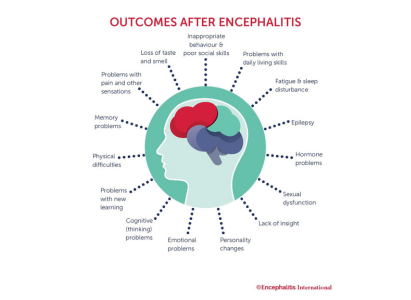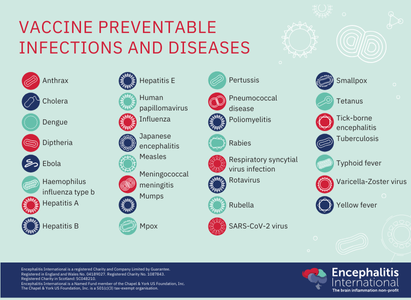
Encephalitis – What Travellers Need to Know
Dr Ava Easton
encephalitis
/ɛnˌsɛfəˈlʌɪtɪs,ɛnˌkɛfəˈlʌɪtɪs/
noun: encephalitis
plural encephalitides
from Greek enkephalos (“brain”) and itis (“inflammation”),
inflammation of the brain, caused by infection or an autoimmune reaction.
Encephalitis can occur anywhere in the world and can affect people of any age, gender or ethnicity.
Encephalitis has a high mortality rate – up to 40% depending on the cause. In those who survive many may sustain an injury to the brain as a result.
Encephalitis as a result of infectious causes often has a quick onset (hours and days) whilst autoimmune causes can often present with a much longer and slower onset (days, weeks and in some cases months).

Both types of encephalitis can present with dramatically different symptoms: infectious encephalitis might begin with flu-like symptoms, dizziness, severe headache, and in some cases fever. Later stages indicating a more serious illness are confusion, drowsiness, losing consciousness, and in some cases seizures and eventually coma. People may also describe sensitivity to light, other sensory changes as well as difficulty speaking or controlling their movements. Family members or friends often describe the person as behaving out of character.
Autoimmune causes of encephalitis can present very differently and many cases may be misdiagnosed initially as having mental health or psychiatric illness. Symptoms will vary depending on the cause but may include confusion, altered personality/behaviour, psychosis, movement disorders, involuntary motor or vocal tics, seizures, hallucinations, memory loss, sleep disturbances.

One of two of the more famous descriptions of the conditions onset and outcome is this:
“Are you feeling all right?” I asked her.
“I feel all sleepy, ” she said.
In an hour, she was unconscious. In twelve hours she was dead.
The measles had turned into a terrible thing called measles encephalitis and there was nothing the doctors could do to save her.
This excerpt, published in 1986 is author Roald Dahl recounting the sudden death of his eldest child, seven-year-old Olivia. A passionate vaccine champion Dahl never got over her death and encouraged anyone who would listen to vaccinate their children. Since then a film called To Olivia, recounting this sad tale was released in 2021.
In 1973 a form of encephalitis which emerged in the late 1800s/early 1900s called Encephalitis Lethargica was made famous in the book Awakenings by Oliver Sacks. The book became a film of the same name released in 1990 starring Robin Williams as Sacks and Robert de Niro as lead patient Leonard.
Encephalitis should perhaps however be more at the forefront of all our minds especially when travelling.
Whilst many causes of encephalitis are not preventable there are some causes that are vaccine-preventable. These include measles, mumps, rubella, chicken-pox, polio, rabies, Japanese encephalitis, tick-borne encephalitis, among many others.
It is important to think about using vaccines to prevent ill-health when we are in our home-countries but also important to think about the threats we may face when we travel to other countries for work and vacations. In these instances we may encounter illnesses that our immune systems might not be equipped to fight.
Travellers should think about the health risks associated with the countries they plan to visit, and consider seeking travel health advice from family doctors, high street pharmacies or specialist travel clinics. Often travel health advice errs toward likelihood when dispensing information so ask about severity too in order to help you make a decision that is right for you. There are for example areas such as south-east Asia and the pacific where serious causes of encephalitis exist such as Japanese encephalitis. On the other hand many people are not aware that areas in Europe such as Austria, Sweden, and Switzerland, contain rural ‘hot spots’ for certain causes of encephalitis such as tick-borne encephalitis, especially if they are on walking or cycling holidays. In addition to vaccination many environmental prevention measures can be taken such as using insect repellent (to deter ticks and mosquitoes), wearing long sleeved clothing with trousers and socks, sleeping in rooms with air conditioning and mosquito nets and screens, checking your body for ticks after being outside, and avoiding interactions with any animals which may scratch or bite to reduce the potential for rabies.
Go to https://www.encephalitis.info/infectious-encephalitis-guidelines-for-travellers for more information. Additionally, our NosiLife collection is perfect to help prevent tick and mosquito bites

